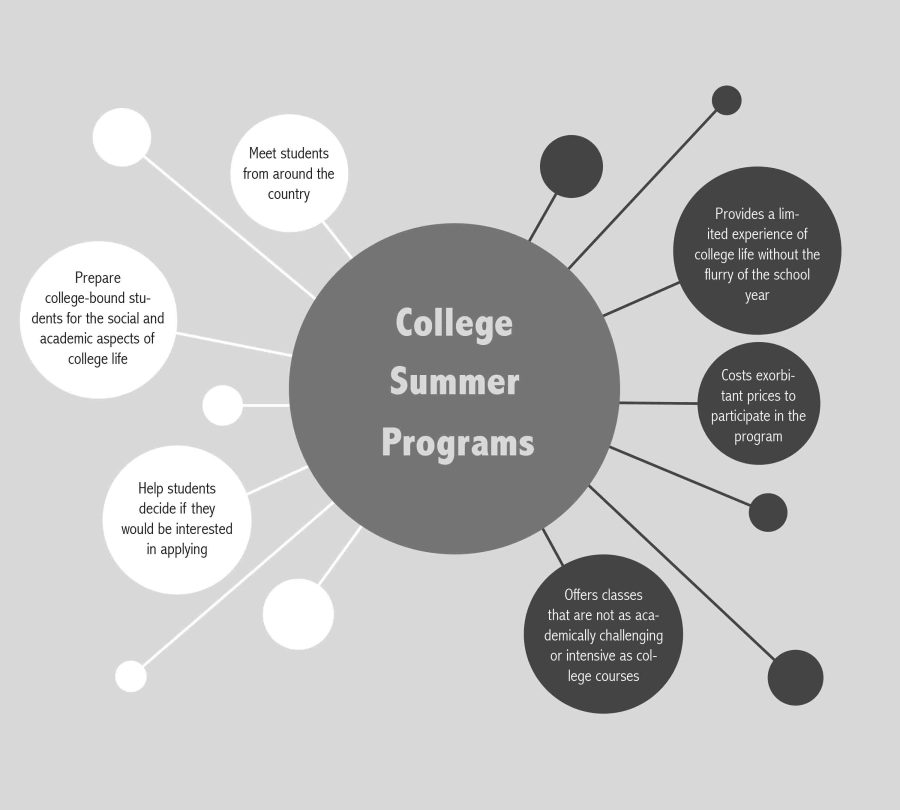Should high school students attend college programs over the summer? NO
Thanks to the CollegeBoard’s Student Search Service option available on standardized tests such as the SAT Reasoning Test and PSAT, email inboxes flood with invitations from colleges all across the countries, most with the subject line something along the lines of, “We Want YOU” or “Explore New Horizons at ____ University.” Colleges spend thousands of dollars sending out seemingly personalized letters that formally invite students to spend the summer on campus taking college courses, enriching their education and experiencing college life in a residential dorm setting.
These summer “enrichment” courses have boomed with popularity in recent years. Top-ranking universities such as University of Southern California, Georgetown University and hundreds more, host high school students who spend from a few of days to four-weeks on campus taking college-level classes over the summer. Almost every college-level school in the country has a summer program that is offered to students sometimes as young as 12 years old.
Students enroll by the thousands in these programs. The main attractions, as promoted by program advertisements, are experiencing the excitement and environment of college life, taking courses with university-level rigor, earning college credit and most prominently, distinguishing oneself on future applications as a student with academic ambition and drive. Despite these apparent appeals, however, these programs are ultimately not worth the big dollars that they cost.
All brochures, websites and fliers that advertise college summer programs emphasize the importance of college life experience, complete with dining halls, meal plans and extra-long twin beds. While there might be value in facing “homesickness” before college, these programs fail to completely replicate college life. During the summer, when school is not in session, the campus lacks the regular flurry of student life, thus limiting the full experience of living with peers in contained quarters. Even at schools with a summer term, the buzz on campus does not match the normal amount of on-campus activity. However, the prices of residence and dining will stay true to the normal-term standards, costing upwards of $1,000 alone for housing in the course of one week. At Ivy League schools such as Columbia University, housing costs $3,200, on top of a $4,500 tuition fee, which excludes travel, insurance and activity fees.
Another large selling-point of these opportunities is the rigorous college classes that could expand the wealth of academic knowledge that one already possesses. However, according to Taylor, a student whose name has been changed and has who participated in the summer program at Columbia University, the classes offered are not as academically challenging or intensive as they may seem.
“The coursework is obscenely easy and most of the classes have 50+ students, so you are extremely lucky if the [professor] even knows your name,” Taylor said. “The teachers are extremely busy and don’t even have time to meet with you if you want to clarify something after class.”
Gaining college credit serves as a motivating factor that drives many students onto college campuses. However, course credit is also available at significantly less expensive programs, particularly the Foothill College summer program, which offers a broad range of classes to high school upperclassmen. Alternatively, instead of spending $5,000 on tuition and another couple thousand on residence, Palo Alto students can take local classes for $31.
A user on College Confidential, a forum designed to promote sharing and communication about college, advocates for more local options as opposed to costly programs available at top-ranking schools.
“Students truly interested in studying a particular subject matter and not interested in the party scene or wasting money would most likely be better off taking classes at a local college or [community college], where the students attending are there to earn credits, not [to] have fun,” the anonymous user said.
Lastly, and perhaps most notably, students hope that adding college experience to their résumé will increase their chances of getting admitted into schools when their times come. It’s no secret that there is no sure-fire way to 100 percent guarantee admission into a college, but most universities will preach a single, universally accepted mantra: “we want someone who stands out.”
Participating in these programs does not automatically distinguish you as a student or individual, due to the fact that thousands and thousands of high school hopefuls flood the campuses of prestigious universities each summer, all with the aspiration of adding another line on their Common Application. Most programs, in fact, will note at the bottom of their web page in tiny font that participants are not granted special advantage during the admissions process.
Instead of spending time and money at these programs, students can invest their time in work, volunteering, sports and fine arts activities. Engaging in thse activities will more accurately reflect a student’s own initiative and individualism than participating in college programs that receive thousands of other students.
In conclusion, there are many more effective and productive ways to spend a summer than on a multi-thousand dollar, prestigious college program that may not deliver all that it promises.
Your donation will support the student journalists of Palo Alto High School's newspaper













